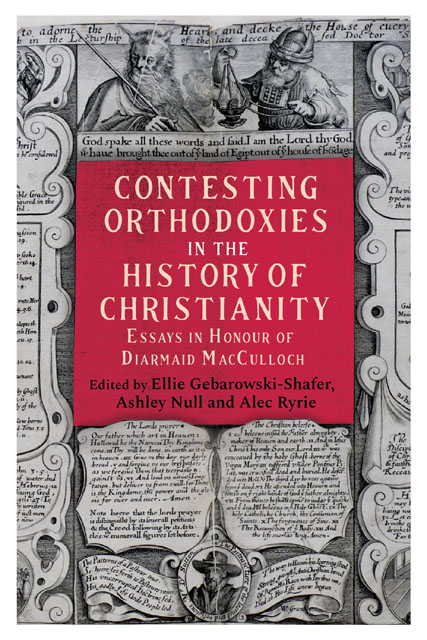Book contents
- Frontmatter
- Contents
- List of Illustrations
- List of Contributors
- List of Abbreviations
- Introduction
- 1 ‘Jewish Christianity’ in Antiquity: Meaningless Category or Heuristic Irritant?
- 2 ‘Sola Fide’: the Wrong Slogan?
- 3 Both Cromwellian and Augustinian: the Influence of Thomas Cromwell on Reform within the Early Modern English Austin Friars
- 4 Lex, Rex and Sex: The Bigamy of Philipp of Hesse and the Lutheran Recourse to Natural Law
- 5 The Authority of Scripture in Reformation Anglicanism: Then and Now
- 6 Orthodoxy and Heresy in the Post-Reformation
- 7 Profanity and Piety in the Church Porch: the Place of Transgression in Early Modern England
- 8 Writing on the Walls: Word and Image in the Post-Reformation English Church
- 9 The Myth of the Church of England
- 10 Mysticism, Orthodoxy and Reformed Identity before the English Revolution: the Case of John Everard
- 11 Sacrilege and the Sacred in England’s Second Reformation, 1640–1660
- 12 ‘I had not the patience to be quiet’: Arthur Bury and The Naked Gospel
- 13 ‘A soul-corrupting indifferentism’: the Intellectual Development of Benjamin Henry Latrobe
- 14 Newman, Dogma and Freedom in the Church
- 15 ‘Tommy, ’ow’s yer soul?’ Reconsidering Religion and the British Soldier
- 16 The King James Vulgate
- 17 The Myth of the Anglican Communion?
- Select bibliography of Diarmaid MacCulloch’s scholarly publications
- Bibliography
- Index
- Tabula Gratulatoria
- Studies in Modern British Religious History
17 - The Myth of the Anglican Communion?
Published online by Cambridge University Press: 09 January 2024
- Frontmatter
- Contents
- List of Illustrations
- List of Contributors
- List of Abbreviations
- Introduction
- 1 ‘Jewish Christianity’ in Antiquity: Meaningless Category or Heuristic Irritant?
- 2 ‘Sola Fide’: the Wrong Slogan?
- 3 Both Cromwellian and Augustinian: the Influence of Thomas Cromwell on Reform within the Early Modern English Austin Friars
- 4 Lex, Rex and Sex: The Bigamy of Philipp of Hesse and the Lutheran Recourse to Natural Law
- 5 The Authority of Scripture in Reformation Anglicanism: Then and Now
- 6 Orthodoxy and Heresy in the Post-Reformation
- 7 Profanity and Piety in the Church Porch: the Place of Transgression in Early Modern England
- 8 Writing on the Walls: Word and Image in the Post-Reformation English Church
- 9 The Myth of the Church of England
- 10 Mysticism, Orthodoxy and Reformed Identity before the English Revolution: the Case of John Everard
- 11 Sacrilege and the Sacred in England’s Second Reformation, 1640–1660
- 12 ‘I had not the patience to be quiet’: Arthur Bury and The Naked Gospel
- 13 ‘A soul-corrupting indifferentism’: the Intellectual Development of Benjamin Henry Latrobe
- 14 Newman, Dogma and Freedom in the Church
- 15 ‘Tommy, ’ow’s yer soul?’ Reconsidering Religion and the British Soldier
- 16 The King James Vulgate
- 17 The Myth of the Anglican Communion?
- Select bibliography of Diarmaid MacCulloch’s scholarly publications
- Bibliography
- Index
- Tabula Gratulatoria
- Studies in Modern British Religious History
Summary
Orthodoxy is universal but lived Christian experience is local and culturally specific: negotiating this relationship has always been tricky. This essay reminds us how odd and problematic we should find the link between the now-global tradition we call ‘Anglicanism’ and the religious history of one island kingdom. Despite persistent myths to the contrary, England does not define Anglicanism, and Anglicanism does not define England. Yet, as the essay argues, as the Anglican Communion has shed its post-imperial trappings, it has also struggled increasingly to define itself and its orthodoxies. Indeed, it has often reverse-engineered the process, deducing a hermeneutical method from the answer to a question on sexual morals which a particular party urgently needs to reach. Yet the Anglican Communion remains more than a myth, having retained bonds of loyalty and commonalities of practice, and theological tools such as provisionality, that allow it to continue to contain at least a degree of diversity.
In his seminal essay ‘The Myth of the English Reformation’, Diarmaid MacCulloch observed ‘that the issue of continuity is as much theological as historical; certainly, at the present day, it lies at the heart of some of the most serious theological debates within the Anglican Communion’. In the thirty years since that article was published, debates about the nature, identity and authority of the Anglican Communion have only intensified, with questions about doctrinal continuity and fidelity assuming increasing prominence. Ashley Null has examined the ways in which the theological inheritance of what he terms ‘Reformation Anglicanism’ has acquired a new traction in the Anglican Communion in the present day, particularly in various provinces in the Global South. Null has demonstrated that these various appeals to the sixteenth-century formularies are themselves diverse and contested, offering competing accounts of what fidelity to that tradition looks like. The primary focus of this essay is on theological questions, rather than strictly historical ones, albeit theological questions considered in historical and historiographical perspective. It makes two central claims: first, that the contested nature of England’s Reformation was written into the early coding of what became the worldwide Anglican Communion; and second, that the nature of ‘orthodoxy’ – not simply which beliefs or practices might (or might not) be understood as ‘orthodox’ – has become contested theological and ecclesiological ground in twenty-first-century global Anglicanism.
- Type
- Chapter
- Information
- Contesting Orthodoxies in the History of ChristianityEssays in Honour of Diarmaid MacCulloch, pp. 294 - 312Publisher: Boydell & BrewerPrint publication year: 2021



